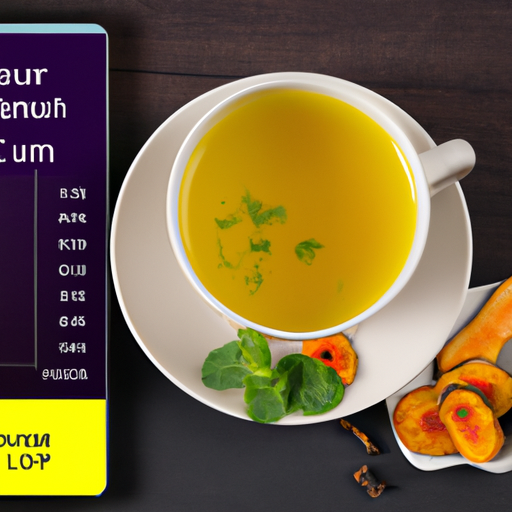As a fan of turmeric tea for its many health benefits, it’s crucial to understand which individuals should steer clear of it. Despite its long history in traditional medicine, certain people may encounter adverse reactions or medication interactions when consuming turmeric.
Firstly, pregnant women and nursing mothers should avoid consuming turmeric tea as there is not enough research on the safety of turmeric during pregnancy and breastfeeding. It is always best to err on the side of caution and consult with a healthcare provider before adding any new supplements or herbs to your diet.
In addition, individuals taking certain medications such as blood thinners or diabetes medication should also be cautious as turmeric can interact with these drugs. Understanding who should avoid consuming turmeric tea is crucial for promoting safe and effective use of this herbal remedy.
Key Takeaways
- Pregnant women and nursing mothers should avoid turmeric tea due to potential harm to fetus and limited research on curcumin effects on breast milk production.
- Individuals taking blood thinners or diabetes medication should be cautious as turmeric can interact with these drugs and increase their effects.
- Turmeric may benefit individuals with certain types of liver disease by reducing inflammation and oxidative stress, but those with existing liver conditions or taking medications affecting liver function should consult with their healthcare provider.
- People with bleeding disorders should avoid consuming turmeric tea due to its potential impact on their health.
Overview of Turmeric Tea and Its Health Benefits
If you’re looking for a healthy and delicious way to boost your immune system and reduce inflammation, you should definitely try drinking turmeric tea! Turmeric is a spice that has been used for centuries in Ayurvedic medicine to treat a variety of ailments. It contains curcumin, which has powerful anti-inflammatory and antioxidant properties.
To make turmeric tea, simply heat water and add turmeric powder or fresh grated turmeric root. You can also add other spices like ginger or cinnamon for added flavor. The recommended dosage is about 1-2 teaspoons of turmeric per cup of water, but it’s important to note that excessive consumption can lead to some side effects such as nausea or diarrhea.
Now let’s move on to who should avoid drinking this tea, particularly pregnant women.
Pregnant Women
Pregnant women should be cautious about consuming turmeric tea. While turmeric in moderation is generally safe for consumption, high doses of the herb may cause uterine contractions and bleeding, which can be harmful during pregnancy. It is recommended that pregnant women limit their intake of turmeric to culinary amounts only, rather than consuming it in supplement or tea form.
In addition to potential harm to the fetus, there are other precautions for pregnant women when it comes to consuming turmeric tea. Turmeric has blood-thinning properties which could interfere with blood clotting during childbirth. As such, it’s important for expectant mothers to consult with their healthcare provider before drinking turmeric tea or taking any dietary supplements during pregnancy.
Nursing mothers should also exercise caution when it comes to consuming turmeric tea.
Nursing Mothers
For new moms who are breastfeeding, it’s important to be mindful of the potential effects that turmeric tea can have on both you and your baby. While turmeric tea is generally considered safe for adults and has several health benefits, it’s important to consider lactation concerns before consuming this beverage.
Here are some things to keep in mind when it comes to turmeric tea and lactation concerns:
- There is limited research on the effects of curcumin (the active ingredient in turmeric) on breast milk production.
- Turmeric can act as a blood thinner, which may increase the risk of bleeding or bruising in both mom and baby.
- Some studies suggest that high doses of curcumin may affect estrogen levels, which could potentially impact breast milk supply.
- Turmeric supplements (in higher doses) have been shown to cause gastrointestinal side effects such as nausea, vomiting, and diarrhea.
With these points in mind, nursing mothers should talk with their healthcare provider before adding turmeric tea or supplements into their diet. It’s especially important to discuss any medications being taken as well as any other health conditions that may impact safety or effectiveness.
Moving forward, let’s take a look at who else should be cautious when it comes to consuming turmeric tea – individuals taking medications.
Individuals Taking Medications
Individuals who regularly take medications should be aware of the potential interactions that turmeric tea may have with their prescriptions, as studies have shown that up to 20% of prescription medication users also consume herbal supplements. The active ingredient in turmeric, curcumin, can interact with certain medications by either increasing or decreasing their effectiveness. For example, curcumin can increase the risk of bleeding when taken with blood thinners such as warfarin and aspirin.
To avoid potential medication interactions, it is important to consult with a healthcare provider before adding turmeric tea to your daily routine. Your doctor may recommend adjusting your medication dosage or avoiding certain drugs altogether while consuming turmeric tea. It is also recommended to follow dosage recommendations for turmeric tea and not exceed the recommended amount. By taking these precautions, individuals can safely incorporate turmeric tea into their diet without compromising their overall health.
Individuals who are experiencing gallbladder problems should also be cautious when consuming turmeric tea.
People with Gallbladder Problems
As someone who’s struggled with gallbladder problems in the past, I’m aware of the caution that needs to be taken when it comes to consuming certain foods and drinks.
Turmeric tea is one such beverage that should be approached with care by those with gallstones or other related issues. It’s important to consult with a healthcare professional before incorporating turmeric or any new food or supplement into your diet if you have a history of gallbladder problems.
Turmeric and Gallstones
Hey there, if you’re someone who’s had issues with gallstones in the past, it’s important to note that turmeric tea may not be the best choice for you. While turmeric has anti-inflammatory and antioxidant properties, it can also stimulate bile production, which may exacerbate symptoms of gallbladder disease.
Here are some things to keep in mind if you’re considering drinking turmeric tea:
-
Turmeric tea and kidney stones: While there’s no direct link between turmeric tea consumption and kidney stones, individuals with a history of kidney stones should exercise caution as excess consumption of turmeric can increase the risk of developing oxalate-based kidney stones.
-
Turmeric tea and liver disease: Some studies suggest that curcumin, the active ingredient in turmeric, may benefit individuals with certain types of liver disease by reducing inflammation and oxidative stress. However, if you have an existing liver condition or are taking medications that affect your liver function, it’s important to speak with your healthcare provider before consuming turmeric tea.
-
Dosage considerations: As with any supplement or herb, moderation is key. The recommended dosage for healthy adults is up to 1 teaspoon (or 4 grams) per day. Exceeding this amount may cause gastrointestinal discomfort or interact with certain medications.
-
Interactions with medication: Turmeric may interact with blood thinners such as warfarin or aspirin and increase their effects. It’s also known to inhibit drug-metabolizing enzymes which can impact how other medications are processed by the body.
-
Allergic reactions: While rare, some individuals may experience allergic reactions such as hives or difficulty breathing when consuming turmeric.
If you have a history of gallstones or any other medical condition, it’s always wise to consult with a healthcare professional before incorporating new foods or supplements into your diet. They can help determine whether turmeric tea is safe for you and provide guidance on appropriate dosage and potential interactions with other medications.
Consultation with a Healthcare Professional
Before incorporating turmeric tea into your diet, it’s important to consult with a healthcare professional to ensure that it’s safe for you and won’t interact with any medications or medical conditions you may have. Informed consent is crucial when it comes to making decisions about your health. Discussing the potential risks and benefits of using turmeric tea can help you make an informed decision.
Self-medication can be risky and result in adverse effects, especially if you have underlying medical conditions such as liver or kidney disease. Certain medications like blood thinners can also interact with turmeric, leading to bleeding disorders. Therefore, consulting a healthcare professional before adding turmeric tea to your daily routine is highly recommended.
With their guidance and expertise, they can give personalized advice on whether or not taking turmeric tea would be beneficial for your specific situation. Moving on to people with bleeding disorders…
People with Bleeding Disorders
If you have bleeding disorders, you shouldn’t drink turmeric tea as it can increase the risk of bleeding. This is because turmeric contains a compound called curcumin, which has blood-thinning properties that can interfere with blood-clotting mechanisms in the body. While this may be beneficial for some people with cardiovascular diseases and other conditions that require thinning of the blood, it can be dangerous for individuals with bleeding disorders.
To understand why turmeric tea should be avoided by people with bleeding disorders, it’s important to look at the different types of bleeding risks associated with this condition. The table below summarizes some of these risks and precautions that can help prevent them.
| Type of Bleeding Risk | Precautions |
|---|---|
| Internal Bleeding | Avoid taking aspirin or other non-steroidal anti-inflammatory drugs (NSAIDs) along with turmeric tea. Monitor symptoms such as dizziness, weakness, or abdominal pain that may indicate internal bleeding. Seek medical attention immediately if any of these symptoms occur. |
| External Bleeding | Be cautious when using sharp objects or engaging in activities that may cause cuts or bruises. Apply pressure to any wounds and use appropriate first aid measures to stop bleeding promptly. |
| Excessive Menstrual Bleeding | Avoid consuming large amounts of turmeric tea during menstruation as it can exacerbate menstrual cramps and increase blood flow. |
While turmeric has many health benefits, people with bleeding disorders need to exercise caution when consuming it in any form. In the next section, we will discuss how iron deficiency affects one’s ability to consume turmeric tea safely.
People with Iron Deficiency
Are you someone who struggles with maintaining healthy iron levels? Well, you’ll be pleased to know that incorporating turmeric into your diet can actually help improve your body’s ability to absorb iron. Turmeric contains curcumin, a compound known for its anti-inflammatory properties which can enhance the absorption of iron in the body.
Here are some ways turmeric can benefit those with iron deficiency:
- Turmeric increases the production of red blood cells which can combat anemia symptoms.
- Curcumin found in turmeric improves digestion and reduces inflammation in the gut, which enhances nutrient absorption.
- The antioxidants present in turmeric protect against oxidative stress caused by low iron levels.
- Adding turmeric to meals or drinking it as tea can be an easy and delicious way to boost your daily intake of this essential mineral.
If you have been prescribed any sort of iron supplements or medication for low iron levels, it’s important to consult with a healthcare professional before consuming too much turmeric.
Now let’s move on to discussing how people with allergies should approach incorporating this powerful spice into their diets.
People with Allergies
As someone who’s researched the benefits of turmeric tea, it’s important to note that it may not be suitable for everyone due to potential allergic reactions. While rare, some individuals may experience symptoms such as hives, itching, or even difficulty breathing after consuming turmeric.
As with any new addition to your diet, it’s recommended to consult with a healthcare professional if you have any concerns about potential allergies or interactions with medications.
Potential Allergic Reactions to Turmeric
Turmeric tea may cause allergic reactions in some individuals, so it’s important to be cautious if you have a history of allergies. Turmeric allergy symptoms can range from mild to severe and can include hives, itching, swelling, difficulty breathing, and even anaphylaxis. It’s essential to be aware of these symptoms and seek medical attention immediately if they occur.
If you’re managing turmeric allergies, there are several things you can do to reduce your risk of experiencing an allergic reaction. Firstly, read food labels carefully and avoid products that contain turmeric or curcumin. Secondly, consider using alternative herbs or spices in your cooking instead of turmeric. Thirdly, speak with your healthcare provider about potential treatment options for allergic reactions such as antihistamines or epinephrine auto-injectors.
Consultation with a healthcare professional is crucial when dealing with any form of allergy or adverse reaction to substances like turmeric. By working together with a trusted medical expert and taking steps towards reducing the risk of experiencing allergic reactions through careful management strategies, individuals can continue living healthy lives while avoiding potentially harmful situations.
Consultation with a Healthcare Professional
While potential allergic reactions to turmeric are a concern for some individuals, it’s important to note that there are other risks and precautions to be aware of before consuming turmeric tea. Consulting with a healthcare professional prior to adding turmeric tea into your diet is highly recommended.
Here are three reasons why consultation with a healthcare professional is crucial when considering turmeric tea:
-
They can assess if you have any underlying health conditions that could interact negatively with turmeric.
-
They can provide guidance on the appropriate dosage and frequency of consumption based on your individual needs.
-
They can help monitor any side effects or adverse reactions that may occur.
When it comes to incorporating new foods or supplements into our diets, it’s always best to err on the side of caution and seek advice from a medical professional. In the case of turmeric tea, this becomes even more important as too high of a dose or frequency could potentially lead to negative effects.
Moving forward, it’s also important to consider whether children should consume turmeric tea and what potential risks there may be for this demographic.
Children
Children should avoid consuming turmeric tea due to its potential impact on their development and health. While turmeric tea is generally safe for adults and has been found to have numerous health benefits, the same cannot be said for children.
Firstly, the dosage of turmeric tea that’s appropriate for adults may not be suitable for children as their bodies are still developing. This means they may not be able to metabolize certain compounds in turmeric well, which could lead to adverse effects.
Secondly, studies have shown that high doses of turmeric or curcumin (the active ingredient in turmeric) can interfere with certain enzymes and proteins involved in normal brain function and development in children. This could potentially affect their cognitive abilities, behavior, and even mood regulation.
Therefore, it’s important for parents and caregivers to consult with a healthcare professional before giving any form of turmeric or curcumin supplements to children. Ultimately, while turmeric has been praised for its various health benefits, it’s crucial to exercise caution when considering its use in children’s diets.
Frequently Asked Questions
How to prepare turmeric tea?
Did you know that turmeric is a potent anti-inflammatory agent? To make turmeric tea, boil water and add one teaspoon of turmeric powder. You can also add ginger, honey, or lemon for added benefits.
Can turmeric tea help with weight loss?
I’ve found that turmeric tea benefits weight loss by reducing inflammation, which can lead to obesity. Studies have shown that curcumin, the active ingredient in turmeric, can decrease inflammation and aid in weight management.
What are the possible side effects of turmeric tea?
I experienced digestive issues after drinking turmeric tea regularly. Turmeric tea side effects include stomach upset, nausea, and diarrhea. Precautions should be taken for individuals with medical conditions such as gallbladder problems or bleeding disorders.
Can turmeric tea interact with herbal supplements?
As someone who enjoys turmeric tea and takes herbal supplements, I’ve researched potential interactions. It’s important to take safety precautions and consult with a healthcare provider before combining herbs.
What is the recommended daily dosage of turmeric tea?
To prepare turmeric tea, I recommend using 1-2 teaspoons of turmeric powder per cup of hot water. The recommended daily dosage is up to 3 grams per day, but check with your healthcare provider if you have any concerns.
Conclusion
In conclusion, while turmeric tea has numerous health benefits that are backed by evidence-based research, it isn’t for everyone. Pregnant or nursing mothers, individuals taking certain medications, people with gallbladder problems, bleeding disorders, iron deficiency, or allergies shouldn’t consume turmeric tea.
For children under the age of two, it’s best to consult a pediatrician before introducing them to turmeric tea. However, for those who can safely consume turmeric tea, it can be an enjoyable and soothing beverage that promotes overall well-being.
The warm aroma and spicy flavor of the tea can create a sense of comfort and relaxation in one’s daily routine. As with any dietary supplement or herbal remedy, always consult with a healthcare provider to ensure safe consumption and potential interactions with other medications or health conditions.










